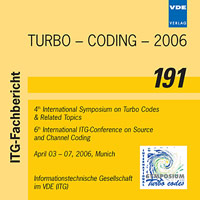MIMO transmission schemes in block fading using multilevel codes with multistage decoding
Konferenz: TURBO - CODING - 2006 - 4th International Symposium on Turbo Codes & Related Topics; 6th International ITG-Conference on Source and Channel Coding
03.04.2006 - 07.04.2006 in Munich, Germany
Tagungsband: TURBO - CODING - 2006
Seiten: 6Sprache: EnglischTyp: PDF
Persönliche VDE-Mitglieder erhalten auf diesen Artikel 10% Rabatt
Autoren:
Lamarca, Meritxell; Lahuerta, Oscar (Technical Univ. of Catalonia (UPC), Barcelona, Spain)
Lou, Hanqing; Garcia-Frias, Javier (Dept. of Electrical and Computer Engineering; Univ. of Delaware, Delaware, USA)
Inhalt:
We compare different transmission schemes for multiple antenna transmission systems based on multilevel codes (MLC). We focus on designs that can approach capacity without the need of an iterative process between the demapper and the decoder. We utilize a new architecture, named MLC-SM, which has been shown to provide nearly optimum performance in the fully interleaved Rayleigh channel without iterative demapping and with a lower complexity than the full multi-level coding scheme. As opposed to BICM and other sub-optimum architectures such as Hybrid Coded Modulation (HCM), the performance of MLC-SM in fast fading scenarios is practically independent of the constellation labeling. In this paper, the design and performance of these architectures is analyzed in the context of block fading channels, and it is shown that MLC-SM still provides the best performance among these non-iterative demapping receivers. However, it can only approach capacity in combination with an architecture reminiscent of D-BLAST. The theoretical results are validated with Monte Carlo simulations using LDGM codes as component codes of the MLC scheme.


